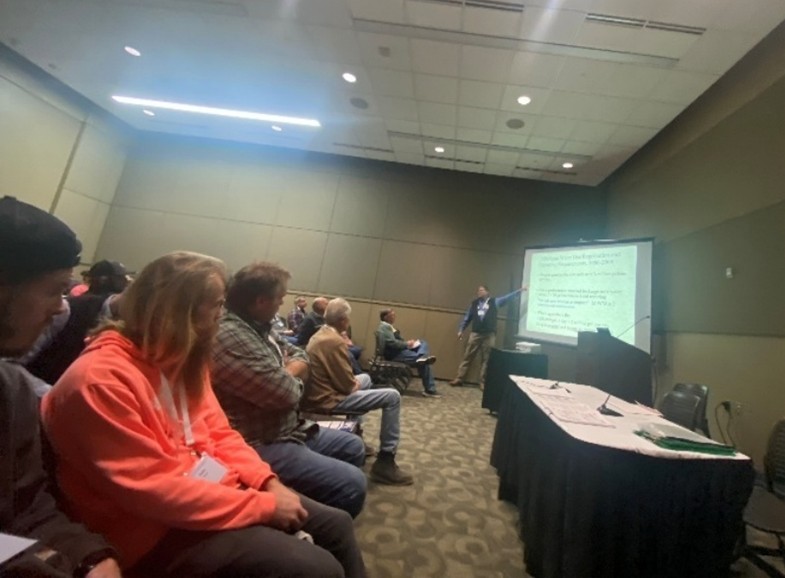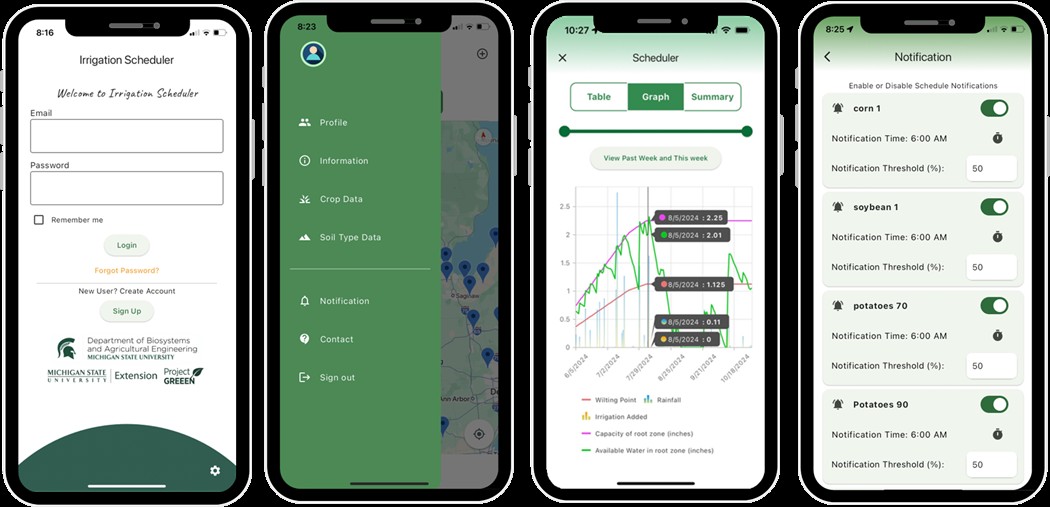
Improving Irrigation Efficiency and Water Sustainability
DOWNLOADJune 19, 2025 - Michigan State University Extension
- 42 invited irrigation presentations were given
- 4,849 farmers, agricultural professionals and policymakers participated in field days
- 163 work groups and farms were visited to support 1,597 farmers and agricultural professionals
Priority Areas
Michigan has almost doubled its irrigated farmland in the last 20 years to deal with unpredictable weather. More farms are now using irrigation, showing how crucial it is for farming. This includes more irrigated corn, wheat and specialty crops, with increasing drip irrigated acres.
Impacts
Over the past 20 years, irrigated farmland in Michigan has nearly doubled, from 432,665 acres in 2003 to 850,380 acres in 2023 (USDA NASS, 2023), driven by increasingly variable weather. The number of irrigated farms grew from 3,886 in 2018 to 4,602 in 2023 (USDA NASS, 2023). Corn and soybeans make up 55% of Michigan’s irrigated acreage, with significant increases in irrigated corn silage and winter wheat. Specialty crops also saw a rise in irrigation, with irrigated acreage growing from 226,583 to 306,752 acres between 2018 and 2023. Drip irrigation use expanded from 39,821 acres to 69,941 acres in the same period (USDA NASS, 2023). These trends highlight the importance of irrigation in adapting to climate change and ensuring agricultural sustainability in Michigan. The two most significant factors influencing irrigation efficiency are the uniformity of the irrigation system and the correct timing of irrigation applications. In 2024, Michigan State University (MSU) Extension employed various methods, including in-person and recorded presentations, articles, websites and field demonstrations, to educate irrigators and policymakers.
Two new agricultural water efficiency extension educators
MSU Extension hired two educators with a focus on agricultural water use efficiency
and irrigation, thanks to a partnership with and funding from the Michigan Department of Environment, Great Lakes and Energy and the Michigan Department of Agriculture and
Rural Development. These educators aim to provide local and statewide leadership teaching farmers how to manage irrigation effectively for crop production. Additionally, guidance on efficient water management practices for raising livestock will be offered, ensuring water resources are used sustainably and productively in all aspects of agriculture.
Specialized education included water productivity and irrigation scheduling tools, including soil moisture sensing. In 2024, over 176 individuals were engaged through presentations and direct education across seven sessions, including key events such as the Michiana Irrigation Association Annual Meeting and the 2024 Great Lakes Expo. As part of MSU Extension’s efforts to support irrigation scheduling, crop water use recommendations were provided for corn and soybeans across three locations in Michigan, reaching more than 1,200 users. Center pivot uniformity tests were also conducted on four irrigation systems in southwest Michigan, aiming to improve irrigation efficiency and promote energy and water savings through enhanced uniformity.
Additional expertise related to increasing the efficiency of drip irrigation systems was shared with growers. This topic was presented on four different occasions in 2024, reaching over 235 producers from Michigan and the Midwest. The most notable events were the Great Lakes Expo and the MSU Extension Blueberry Field Day.
An Extension educator evaluating uniformity distribution of a center pivot irrigation system.
Irrigation education presentations and outreach
In 2024, the MSU irrigation team developed and delivered 42 presentations focused on improving irrigation system uniformity and irrigation scheduling. These presentations were delivered at field days organized by MSU Extension, commodity groups, state agencies and irrigation equipment suppliers. Over 4,849 farmers, agricultural professionals and policymakers attended these sessions. Additionally, farm publications, agricultural magazines and newsletters featured MSU Extension articles on irrigation system efficiency and proper scheduling. The MSU Irrigation website recorded 5,021 visits and 5,816 pageviews
To support producers and irrigation technicians interested in webinars and recorded content, the MSU irrigation team organized a 7-hour recorded Water Day program during the Michigan Ag Ideas to Grow With Conference. Topics included the art of irrigation scheduling, the value of irrigation uniformity and sprinkler choice, irrigation electrical safety, review of 2023 irrigation research, building your skills with Michigan’s large volume water use registration and reporting tool, upgrades to older pivot control systems and 360 Rain—a quick look at the robotic irrigation and nutrient application
system, and the Prairie River water use issue— state agency and user group round table. These recordings serve as a year-round resource on various water management topics.

Michiana Irrigated Corn and Soybean Conference
The Michiana Irrigated Corn and Soybean Conference is an annual effort between MSU Extension and Purdue Extension to provide education and networking opportunities that address facets of growing corn and soybeans under irrigation. Counties along the Michigan-Indiana border (referred to as Michiana) have a higher percentage of irrigated acres than counties in other parts of those states. In 2024, 53 attendees were from Indiana and 74 were from Michigan. The 2024 program included Extension faculty and educators from both MSU and Purdue, including Darcy Telenko, PhD (Purdue), Erin Burns, PhD (MSU), Chris Difonzo, PhD (MSU), Stephen Boyer (Purdue), Shan Casteel, PhD (Purdue), Jeff Burbrink (Purdue), Mike Staton (MSU), Lyndon Kelley (MSU/Purdue), and Younsuk Dong, PhD (MSU). The cost of the event is kept low due to the continued generous support from the corn and soybean checkoff programs of Indiana and Michigan. Certified crop adviser, Michigan restricted use pesticides, Indiana continuing certification hours and Indiana pesticide applicator recertification program credits were provided through the conference.
Each year, a post-meeting survey is given to measure the impact of the education provided. Of the 68 people who returned the survey, 96% indicated their knowledge increased and 66% planned to change some aspect of their farm operation or recommendations to producers as a result of the information presented. These changes were estimated to impact 42,976 acres and result in $492,635 in increased revenue or savings, or an average of $7,245 per respondent.

A 10-month follow-up survey is also sent to participants to see what changes were made during the growing season due to information provided at the meeting. Of the 33 surveys returned, 52% indicated they had changed some aspects of their operation or recommendations to producers during the growing season. These changes were estimated to impact 16,135 acres and result in $167,100 in increased revenue or savings, or an average of $5,064 per respondent.
Improving irrigation water use efficiency using MSU irrigation scheduling smartphone app
A U.S. Department of Agriculture survey indicates 445 Michigan irrigators are using evapotranspiration-based irrigation scheduling, including MSU Irrigation Scheduler, a Microsoft Excel-based tool. In 2024, the MSU irrigation team developed an easy-to-use and improved irrigation scheduling mobile app that can be easily adopted by farmers. The app calculates the crop water requirements and thereby improves irrigation water management for enhanced economic benefits and increases the resiliency of crop production. This app development work was supported by Project GREEEN. In 2024, the prototype of the irrigation scheduling app was shared with selected field crop and fruit growers, Michigan Agriculture Environmental Assurance Program technicians, soil and water conservation staff and crop consultants. Feedback and suggestions were gathered, and the team revised the prototype irrigation scheduling app based on their input.
The app is available in Apple (https://shorturl.at/DeZXZ) and Google (https://shorturl.at/uYjyV) stores in both English and Spanish. As of December 2024, there were 108 registered users and 106 fields covering 19,672 acres of corn, soybeans, vegetables and fruits. The team has trained over 117 ag professionals and growers on the MSU Irrigation Scheduling App at the Great Lakes Fruit, Vegetable and Farm Market Expo and Michiana Irrigation Association Winter Workshop.



 Print
Print Email
Email

